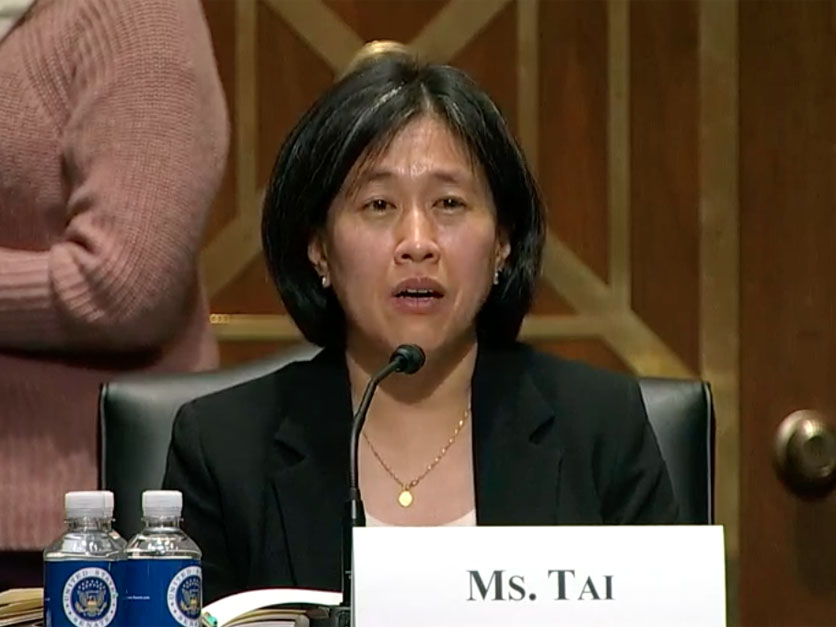The Biden administration is seeking to avoid the practice of creating winners and losers as it tries to expand international trade, Katherine Tai, the nominee to be the next U.S. Trade Representative, told senators Thursday.
“With respect to our trade policies in the past several decades, we often fall into a pattern where one sector of our economy and one segment of our workers feel like their livelihoods … were sacrificed for another part of our economy,” Tai said at a Senate Finance Committee hearing.
Interests of farmers should not be pitted against manufacturers, and the Biden administration wants to “break out of that pattern,” she stressed without going into detail on how that could be accomplished.
Tai’s comments about creating more winners in trade policy was lauded by lawmakers like Sens. Michael Bennet, D-Colo., and Sherrod Brown, D-Ohio, but many on the panel simply wanted to know about plans for the next trade pact or how the Biden administration planned to deal with China.
Tai did not highlight any country or region where the Biden administration might pursue a new free trade agreement, although she did express support for the idea of the U.S. joining the Comprehensive and Progressive Trans-Pacific Partnership — a pact that the Obama administration led the way on creating with 11 other Pacific Rim countries. Former President Donald Trump pulled the U.S. out of the pact — back when it was just called the Trans-Pacific Partnership — in 2017.
She said rejoining the pact was “worth pursuing,” but the U.S. would not likely rejoin without renegotiating terms.
“Today in 2021 the basic formula of TPP … is still a sound formula,” she said. “I think that what I would add is that a lot has changed in the world in the past five or six years and a lot has changed in our awareness about some of the pitfalls of trade policies as we’ve pursued them over recent years.”
As to China, Tai was again guarded, but revealed that the Biden administration would likely have to get creative on how to push back against the country when it is operating in “gray areas where the rules are not clear or where we do not have rules.”
The Trump administration was scorned internationally for its decision to go outside the World Trade Organization’s dispute resolution process by hitting China with section 301 tariffs — actions that sparked the trade war that is effectively still ongoing. Trump officials argued there were no proper channels at the WTO to confront China over its theft of intellectual property and other transgressions.
One option to confront China, Tai said, was to create “new rules to address the gray area,” although she added the U.S. would not do that alone, but rather work with allies.
Tai did not say directly that the Biden administration would use the threat of new tariffs to deal with China, but she also stressed that section 301 tariffs are a useful tool.
Interested in more news on farm programs, trade and rural issues? Sign up for a four-week free trial to Agri-Pulse. You’ll receive our content - absolutely free - during the trial period
“Special 301 (tariffs) should be considered one of the tools in the IP enforcement and monitoring toolbox and its use should be focused on effectiveness … in resolving problems for America’s innovators,” she said.
Another popular topic with senators at the Thursday hearing was the prospect of a free-trade agreement with the UK. Those talks were idled after the November election in the U.S., and British government officials said privately they hoped the Biden administration would agree to pick up the talks quickly where they stood.
But Tai said Thursday she wasn’t ready for that. Former USTR Robert Lighthizer was late in submitting progress reports on talks with the UK and she said she has a lot to get caught up on before any negotiations can resume.
Iowa Republican Sen. Chuck Grassley was one of the lawmakers looking for an answer on the UK talks, but he also pressed her on the need to get Brazil to lift its tariffs on U.S. ethanol.
Brazil imposed a 20% tariff on U.S. ethanol in December after the two countries failed to reach an agreement to reinstate a tariff rate quota for the corn-based fuel.
Tai made no commitment on the issue and emphasized that she would need time to get up to speed on the dispute.
For more news, go to www.Agri-Pulse.com.


